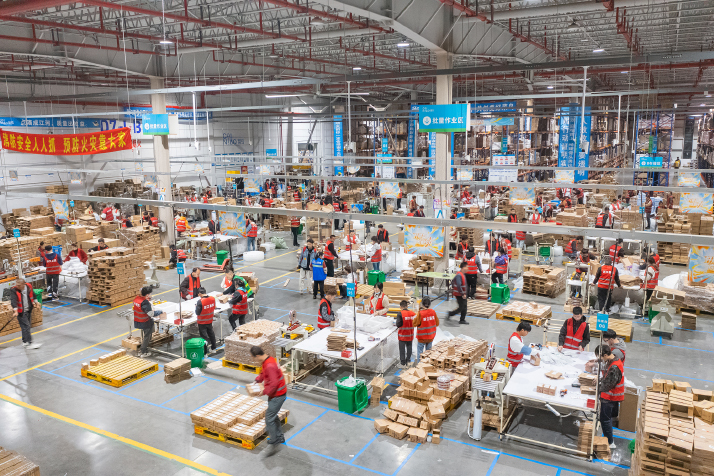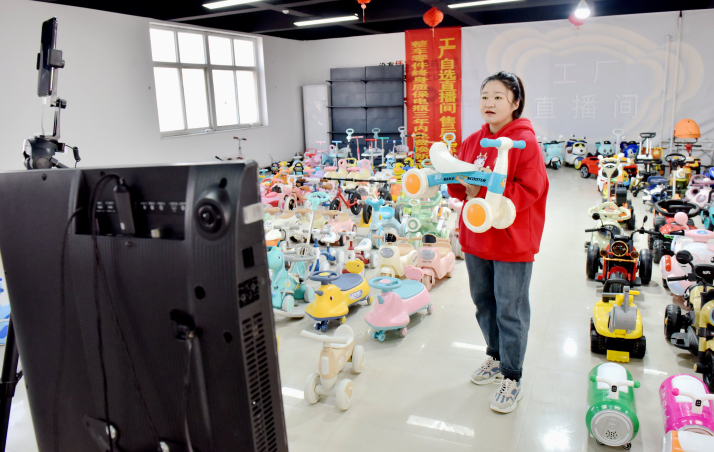| China |
| Thirty years of Internet development has opened doors to new jobs | |
|
|
 (Above) An e-commerce specialist sells ride-on toys on a livestreaming platform in Weixian County in Xingtai, Hubei Province, on November 29 Staff package products at the Yiwu Comprehensive Bonded Zone in Yiwu, Zhejiang Province, on November 12, 2023 (XINHUA)
On April 20, 1994, the Chinese Academy of Sciences Institute of High Energy Physics in Beijing achieved China's first fully functional connection to the Internet. This pilot network was designed to support education and scientific research, making China the 77th member country of the global Internet community. At that time, it was difficult to imagine that by December 2023, approximately 77.5 percent of Chinese citizens would be Internet users, with their number exceeding 1.09 billion. In the past three decades, China's Internet has seen remarkable and rapid growth, leading to the rise of many well-known related companies. This has fueled the emergence of new applications of the Internet and innovative business models, such as e-commerce, food delivery services, short video platforms and artificial intelligence technologies. Internet technologies have fostered collaboration and integration between industries, creating new hubs for the country's social and economic development, and offering new job options for the Chinese people. New trend, new vitality The past 30 years of robust Internet development in China has been accompanied by the rapid evolution of occupations, as indicated in a recent report by the big data institute of Kuaishou, a social media platform. The report emphasizes that during this period, not only have new occupations emerged that are closely related to computers and information technology, such as digital technology engineers and technicians, but also a significant number of traditional occupations have gained new vitality in the wave of digital transformation. This has shaped a whole new career ecology online. Deng Yan is a vlogger and livestreaming host on Kuaishou, focusing on agricultural topics, with 660,000 followers. She also runs a physical store selling farming supplies in Siping, Jilin Province. A former white collar worker, Deng made the decision to strike her roots in northeast China's black earth in 2013. Drawing upon her academic background, she provides scientific guidance for local farmers with the goal of increasing their income and improving agricultural production. In 2018, Deng brought the physical store she had been running for several years online. This expansion allows her to reach farmers in other regions as well, including in neighboring countries such as the Republic of Korea and Mongolia. As an agricultural technician, Deng considers spring plowing season to be the busiest time of year. Her work during this period includes providing field guidance for planting in the morning, managing deliveries at her store in the afternoon, hosting livestreaming sessions each evening, and preparing materials for upcoming livestreams even after midnight. The questions raised during live broadcasts can be challenging, requiring her to conduct research after the broadcast concludes, Deng told media recently. In her videos, viewers can see that, in addition to promoting agricultural technology and selling supplies, she visits farmers every summer to evaluate the effectiveness of technologies and products. Deng said if she doesn't go out to the fields to observe and think about problems from the perspective of farmers, it will be difficult for her to develop online content that meets farmers' real needs. In the past, agricultural technicians relied heavily on extensive field investigations for collecting information. Today, thanks to the Internet, their professional capabilities have been transformed, enabling them to collect and analyze data more efficiently, share agricultural knowledge more accurately, and reach more farmers. With the deep integration of digital technology and agriculture, traditional agricultural production methods have been upgraded, an inevitable trend in the development of modern agriculture. In line with this trend, Deng's work was officially recognized as a new occupation, agricultural digital technician, by the Ministry of Human Resources and Social Security in 2022. In November 2023, the national occupation standard for agricultural digital technicians was approved, aiming to provide more momentum for the development of new agriculture.  An e-commerce specialist sells ride-on toys on a livestreaming platform in Weixian County in Xingtai, Hubei Province, on November 29 (XINHUA)
The more, the better The official list of occupations maintained by the Ministry of Human Resources and Social Security recognized 97 new professions related to digital sectors in 2022. This was the first time the list included professions in the digital sectors, such as digital media artists, e-commerce specialists, and online marketing specialists. The widespread use and innovation of mobile Internet has given rise to new platforms and new business models, Additionally, it has led to a refinement in the division of labor and the replacement of old occupations with new ones. Livestreaming, for example, connects not only viewers with hosts but also consumers with businesses. A livestream marketing host with 600,000 followers told Xinhua News Agency that a clothing-related livestream carried out in a studio of less than 20 square meters creates over 30 Internet-related jobs and affects the employment of three large factories and 10 small factories. From product selection to livestreaming promotion and after-sales service, close collaboration connects the digital economy with the real economy. Liao Juan, an associate professor at the School of Management at Capital Normal University in Beijing, told Beijing Review that the advancement of Internet and computer technology has also led to an increase in job opportunities for individuals with disabilities. For example, Canyou Group was established in 1997 in Shenzhen, Guangdong Province, located in south China. The company specializes in services related to blockchain technology, building information modeling, comprehensive health services, and other sectors. Notably, 90 percent of the company's employees have physical disabilities. The employment prospects for people with visual impairments have expanded beyond their traditional roles in China which mainly include providing massage therapy. They now have opportunities to engage in livestreaming where they can sell local products or pursue more specialized occupations such as audio broadcasting. "Such work would have been impossible in the past when Internet technology was not as advanced or widely accessible," Liao said. "Despite facing barriers within the social environment that hinder their effective use of the Internet, it is crucial to empower individuals with disabilities and assist them in finding better online job opportunities." (Printed Edition Title: Accessing Miracles) Copyedited by G.P. Wilson Comments to liqing@cicgamericas.com |
|
||||||||||||||||||||||||||||||
|
